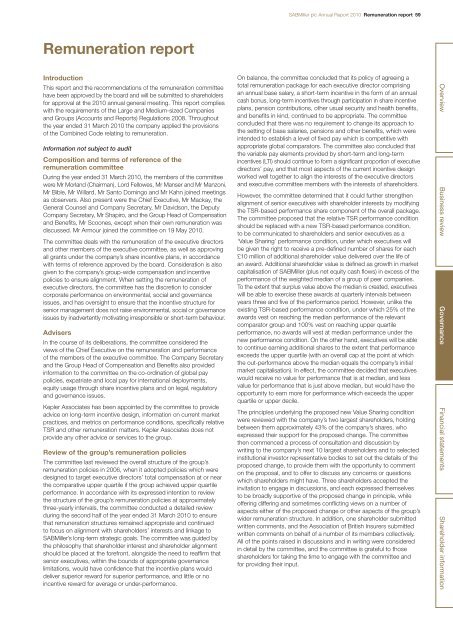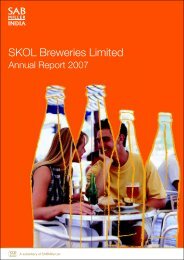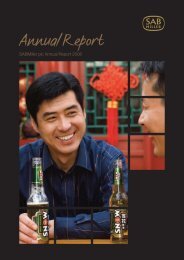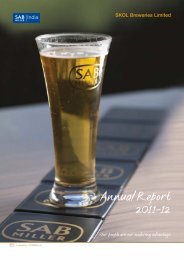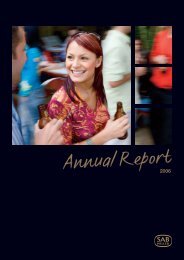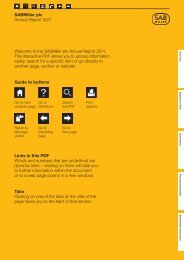Annual Report - SABMiller
Annual Report - SABMiller
Annual Report - SABMiller
- No tags were found...
Create successful ePaper yourself
Turn your PDF publications into a flip-book with our unique Google optimized e-Paper software.
<strong>SABMiller</strong> plc <strong>Annual</strong> <strong>Report</strong> 2010 Remuneration report 59Remuneration reportIntroductionThis report and the recommendations of the remuneration committeehave been approved by the board and will be submitted to shareholdersfor approval at the 2010 annual general meeting. This report complieswith the requirements of the Large and Medium-sized Companiesand Groups (Accounts and <strong>Report</strong>s) Regulations 2008. Throughoutthe year ended 31 March 2010 the company applied the provisionsof the Combined Code relating to remuneration.Information not subject to auditComposition and terms of reference of theremuneration committeeDuring the year ended 31 March 2010, the members of the committeewere Mr Morland (Chairman), Lord Fellowes, Mr Manser and Mr Manzoni.Mr Bible, Mr Willard, Mr Santo Domingo and Mr Kahn joined meetingsas observers. Also present were the Chief Executive, Mr Mackay, theGeneral Counsel and Company Secretary, Mr Davidson, the DeputyCompany Secretary, Mr Shapiro, and the Group Head of Compensationand Benefits, Mr Scoones, except when their own remuneration wasdiscussed. Mr Armour joined the committee on 19 May 2010.The committee deals with the remuneration of the executive directorsand other members of the executive committee, as well as approvingall grants under the company’s share incentive plans, in accordancewith terms of reference approved by the board. Consideration is alsogiven to the company’s group-wide compensation and incentivepolicies to ensure alignment. When setting the remuneration ofexecutive directors, the committee has the discretion to considercorporate performance on environmental, social and governanceissues, and has oversight to ensure that the incentive structure forsenior management does not raise environmental, social or governanceissues by inadvertently motivating irresponsible or short-term behaviour.AdvisersIn the course of its deliberations, the committee considered theviews of the Chief Executive on the remuneration and performanceof the members of the executive committee. The Company Secretaryand the Group Head of Compensation and Benefits also providedinformation to the committee on the co-ordination of global paypolicies, expatriate and local pay for international deployments,equity usage through share incentive plans and on legal, regulatoryand governance issues.Kepler Associates has been appointed by the committee to provideadvice on long-term incentive design, information on current marketpractices, and metrics on performance conditions, specifically relativeTSR and other remuneration matters. Kepler Associates does notprovide any other advice or services to the group.Review of the group’s remuneration policiesThe committee last reviewed the overall structure of the group’sremuneration policies in 2006, when it adopted policies which weredesigned to target executive directors’ total compensation at or nearthe comparative upper quartile if the group achieved upper quartileperformance. In accordance with its expressed intention to reviewthe structure of the group’s remuneration policies at approximatelythree-yearly intervals, the committee conducted a detailed reviewduring the second half of the year ended 31 March 2010 to ensurethat remuneration structures remained appropriate and continuedto focus on alignment with shareholders’ interests and linkage to<strong>SABMiller</strong>’s long-term strategic goals. The committee was guided bythe philosophy that shareholder interest and shareholder alignmentshould be placed at the forefront, alongside the need to reaffirm thatsenior executives, within the bounds of appropriate governancelimitations, would have confidence that the incentive plans woulddeliver superior reward for superior performance, and little or noincentive reward for average or under-performance.On balance, the committee concluded that its policy of agreeing atotal remuneration package for each executive director comprisingan annual base salary, a short-term incentive in the form of an annualcash bonus, long-term incentives through participation in share incentiveplans, pension contributions, other usual security and health benefits,and benefits in kind, continued to be appropriate. The committeeconcluded that there was no requirement to change its approach tothe setting of base salaries, pensions and other benefits, which wereintended to establish a level of fixed pay which is competitive withappropriate global comparators. The committee also concluded thatthe variable pay elements provided by short-term and long-termincentives (LTI) should continue to form a significant proportion of executivedirectors’ pay, and that most aspects of the current incentive designworked well together to align the interests of the executive directorsand executive committee members with the interests of shareholders.However, the committee determined that it could further strengthenalignment of senior executives with shareholder interests by modifyingthe TSR-based performance share component of the overall package.The committee proposed that the relative TSR performance conditionshould be replaced with a new TSR-based performance condition,to be communicated to shareholders and senior executives as a‘Value Sharing’ performance condition, under which executives willbe given the right to receive a pre-defined number of shares for each£10 million of additional shareholder value delivered over the life ofan award. Additional shareholder value is defined as growth in marketcapitalisation of <strong>SABMiller</strong> (plus net equity cash flows) in excess of theperformance of the weighted median of a group of peer companies.To the extent that surplus value above the median is created, executiveswill be able to exercise these awards at quarterly intervals betweenyears three and five of the performance period. However, unlike theexisting TSR-based performance condition, under which 25% of theawards vest on reaching the median performance of the relevantcomparator group and 100% vest on reaching upper quartileperformance, no awards will vest at median performance under thenew performance condition. On the other hand, executives will be ableto continue earning additional shares to the extent that performanceexceeds the upper quartile (with an overall cap at the point at whichthe out-performance above the median equals the company’s initialmarket capitalisation). In effect, the committee decided that executiveswould receive no value for performance that is at median, and lessvalue for performance that is just above median, but would have theopportunity to earn more for performance which exceeds the upperquartile or upper decile.The principles underlying the proposed new Value Sharing conditionwere reviewed with the company’s two largest shareholders, holdingbetween them approximately 43% of the company’s shares, whoexpressed their support for the proposed change. The committeethen commenced a process of consultation and discussion bywriting to the company’s next 10 largest shareholders and to selectedinstitutional investor representative bodies to set out the details of theproposed change, to provide them with the opportunity to commenton the proposal, and to offer to discuss any concerns or questionswhich shareholders might have. Three shareholders accepted theinvitation to engage in discussions, and each expressed themselvesto be broadly supportive of the proposed change in principle, whileoffering differing and sometimes conflicting views on a number ofaspects either of the proposed change or other aspects of the group’swider remuneration structure. In addition, one shareholder submittedwritten comments, and the Association of British Insurers submittedwritten comments on behalf of a number of its members collectively.All of the points raised in discussions and in writing were consideredin detail by the committee, and the committee is grateful to thoseshareholders for taking the time to engage with the committee andfor providing their input.Overview Business review Governance Financial statements Shareholder information


